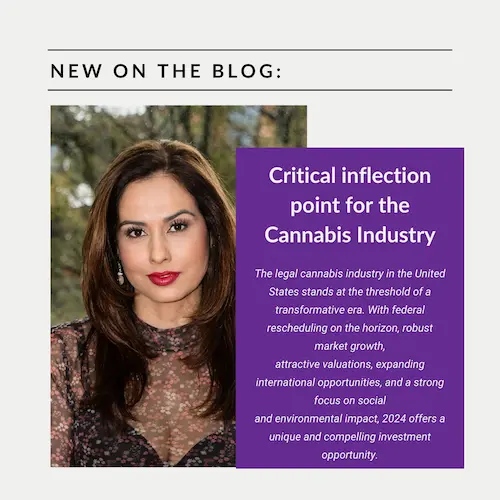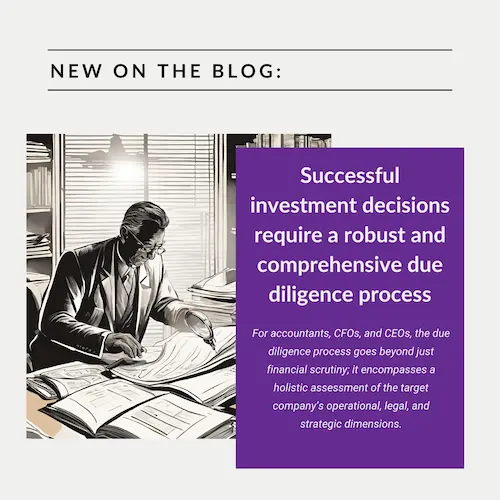Why 2024 is a Pivotal Year for Investing in Legal Cannabis: A Detailed Analysis for CEOs and CFOs
Abstract
The legal cannabis industry in the United States is approaching a critical inflection point, making 2024 a strategically opportune moment for investment. The potential rescheduling of cannabis from a Schedule I to a Schedule III substance, combined with sustained market expansion and emerging global opportunities, positions this year as a transformative period for stakeholders. This article delves into five key factors that underscore why 2024 represents an optimal investment horizon for CEOs and CFOs in the legal cannabis sector.
Key words: Cannabis industry, 2024 investment, Legalization, Federal rescheduling – Schedule III, Market growth, Valuations, Banking access, Tax benefits, Research and development, International markets, Environmental sustainability, Public health, U.S. cannabis market, Germany legalization, Global expansion, Social equity.
-
1.The Potential Rescheduling of Cannabis: Industry-Wide Implications
The rescheduling of cannabis has been a focal point of industry discourse, with significant implications for market operations, regulatory compliance, and financial strategies. Currently, cannabis is classified as a Schedule I substance under the Controlled Substances Act (CSA), indicating “no accepted medical use and a high potential for abuse.” This classification places it in the same category as substances such as heroin and LSD, severely limiting research, banking access, and investment opportunities.
In 2023, the U.S. Department of Health and Human Services (HHS) recommended the rescheduling of cannabis to Schedule III. If this recommendation is implemented, the following industry shifts are anticipated:
- Enhanced Banking and Financial Access: Schedule III classification would alleviate many banking restrictions currently imposed on cannabis businesses. According to the National Cannabis Industry Association (NCIA), 70% of cannabis companies face challenges in securing banking services. With rescheduling, cannabis businesses could access traditional financial products, including loans and lines of credit, crucial for scaling operations and managing cash flow more effectively.
- Tax Relief Through Section 280E: Under Section 280E of the Internal Revenue Code, businesses dealing in Schedule I or II substances cannot deduct ordinary business expenses, significantly impacting profitability. Rescheduling cannabis to Schedule III would exempt these businesses from Section 280E, allowing them to deduct operational expenses and improve net margins. An analysis by Whitney Economics suggests that this change could increase industry-wide profitability by up to 30%.
- Expansion of Research and Development: A Schedule III classification would lower regulatory barriers for cannabis research, fostering innovation in medical applications and product development. This could catalyze the growth of cannabis-based pharmaceuticals, further expanding market potential. The global medical cannabis market is expected to reach $37.9 billion by 2025, according to Grand View Research, driven by increased R&D activities.
2.Market Dynamics: A Multi-Billion Dollar Industry on the Rise
The U.S. legal cannabis market has exhibited robust growth over the past decade, with significant projections for continued expansion. As of 2022, the market was valued at approximately $33 billion, with a compound annual growth rate (CAGR) of 14%, projected to reach $57 billion by 2027 (New Frontier Data).
Several drivers underpin this growth:
- Widespread Legalization: By 2024, 38 states have legalized medical cannabis, and 23 states have legalized recreational use. This trend is anticipated to continue as more states recognize the economic, medical, and social benefits of legalization. The increasing legal footprint will likely drive market expansion and attract further investment.
- Expanding Consumer Base: Public acceptance of cannabis continues to grow, with a Gallup poll from 2023 indicating that 68% of Americans support legalization, compared to 52% in 2013. This shift is particularly pronounced among younger demographics, such as Millennials and Gen Z, who are more likely to use cannabis and influence future market trends. According to BDS Analytics, the number of active cannabis consumers is expected to surpass 40 million by 2025.
- Product Innovation and Diversification: The cannabis industry has evolved beyond traditional products, offering a range of edibles, beverages, topicals, and concentrates. This diversification has broadened the consumer base and enhanced market penetration. For example, the global market for cannabis-infused beverages is projected to grow at a CAGR of 17.8% from 2021 to 2028 (Grand View Research).
3. Valuation Trends: Capitalizing on Market Volatility
Despite the growth trajectory, cannabis stocks have experienced volatility, leading to attractive valuations for strategic investors. Several factors have contributed to recent price fluctuations:
- Regulatory Uncertainty: The slow pace of federal reform and inconsistent state regulations have introduced uncertainty, affecting investor confidence and stock prices. However, these regulatory challenges are likely temporary, with federal rescheduling and state-level legislative advancements expected to stabilize the market.
- Market Saturation: In mature markets like California, overproduction has led to price compression, challenging profitability for some operators. However, this is part of a natural market correction, with consolidation and vertical integration likely to restore balance and profitability in the coming years.
- Broader Economic Conditions: The cannabis industry, like others, has been influenced by macroeconomic factors, including rising interest rates and inflation. However, the essential nature of cannabis as a product, combined with its growth potential, positions the industry to weather these challenges better than many other sectors.
Given these dynamics, 2024 presents a window of opportunity for investors to acquire equity in cannabis companies at relatively low valuations. As the market stabilizes and grows, these investments are poised for significant appreciation.
4. Global Expansion: Seizing International Opportunities
While the U.S. remains the largest legal cannabis market, international opportunities are rapidly emerging, offering significant growth potential for American companies:
- Germany: Germany’s 2023 decision to legalize adult-use cannabis positions it as the largest market in Europe, with projections estimating it could generate over $3.5 billion in annual revenue by 2027 (Prohibition Partners). U.S. companies are poised to capitalize on this expansion through strategic partnerships and market entry initiatives.
- Canada: As the first G7 nation to fully legalize cannabis in 2018, Canada continues to be a global leader in the industry. Canadian companies, many of which have cross-border operations with U.S. firms, are expected to benefit from increased collaboration and market synergies as the North American cannabis market matures.
- Latin America: Countries like Mexico, Colombia, and Uruguay are advancing cannabis legalization, creating opportunities for U.S. companies to expand their operations. The Latin American cannabis market is projected to reach $9.8 billion by 2028, driven by favorable regulatory changes and growing consumer demand (Statista).
5. Social and Environmental Responsibility: Aligning Investment with Impact
Investing in the cannabis industry offers not only financial returns but also the opportunity to contribute to social equity and environmental sustainability:
- Social Equity Initiatives: Many U.S. states have implemented social equity programs to address the disproportionate impact of the War on Drugs on marginalized communities. By investing in cannabis, stakeholders can support these initiatives, promoting diversity, inclusion, and restorative justice within the industry.
- Environmental Sustainability: The cannabis industry is increasingly focused on sustainable practices, including organic cultivation, water conservation, and renewable energy use. Companies that adopt these practices are not only contributing to environmental stewardship but are also positioning themselves as leaders in the growing market for eco-conscious consumers.
- Public Health Advancements: As research into the medical benefits of cannabis expands, the industry has the potential to revolutionize healthcare. Cannabis-based therapies are already being used to treat conditions such as chronic pain, epilepsy, and PTSD, offering safer alternatives to traditional pharmaceuticals. The global medical cannabis market, estimated at $16.47 billion in 2021, is expected to reach $37.9 billion by 2025 (Fortune Business Insights).
Conclusion
The legal cannabis industry in the United States stands at the threshold of a transformative era. With federal rescheduling on the horizon, robust market growth, attractive valuations, expanding international opportunities, and a strong focus on social and environmental impact, 2024 offers a unique and compelling investment opportunity.
For CEOs and CFOs looking to diversify their portfolios and capitalize on emerging markets, the cannabis industry presents a dynamic and potentially lucrative option. As the industry continues to evolve and mature, those who invest now are well-positioned to benefit from substantial returns and to lead in shaping the future of this rapidly expanding sector.
Los Angeles Investor Conference – Cannabis & Psychedelics Investing Forum:
If you’re eager to capitalize on the growing opportunities within the legal cannabis industry, I invite you to join us at the Los Angeles Investor Conference. This premier event brings together leading industry experts, innovative entrepreneurs, and savvy investors to discuss the latest trends, opportunities, and challenges in cannabis investment. Held in the vibrant heart of Los Angeles (Santa Monica), the conference is an unparalleled platform for networking, gaining insights, and exploring potential partnerships that can propel your investment portfolio to new heights.
Don’t miss this chance to be at the forefront of the cannabis investment revolution. Whether you’re a seasoned investor or new to the industry, the Los Angeles Investor Conference offers valuable sessions on regulatory changes, market forecasts, and emerging investment strategies. Secure your spot today by visiting the official event page here, and take the first step towards making informed and profitable decisions in the rapidly evolving cannabis market.
https://www.eventbrite.com/e/los-angeles-investor-conference-tickets-950350242157?aff=CarolOrtega
—————
Banner content:
Why 2024 is the Right Year to Invest in Legal Cannabis
- Upcoming Rescheduling of Cannabis: A Game-Changer for the Industry
- Robust Market Growth: A Multi-Billion Dollar Industry
- Attractive Valuations: A Window of Opportunity
- Emerging International Markets: Global Expansion Opportunities
- Social and Environmental Impact: Investing in a Sustainable Future
Subscribe to our blog NewsLetter here: Seecarolinvest.com





